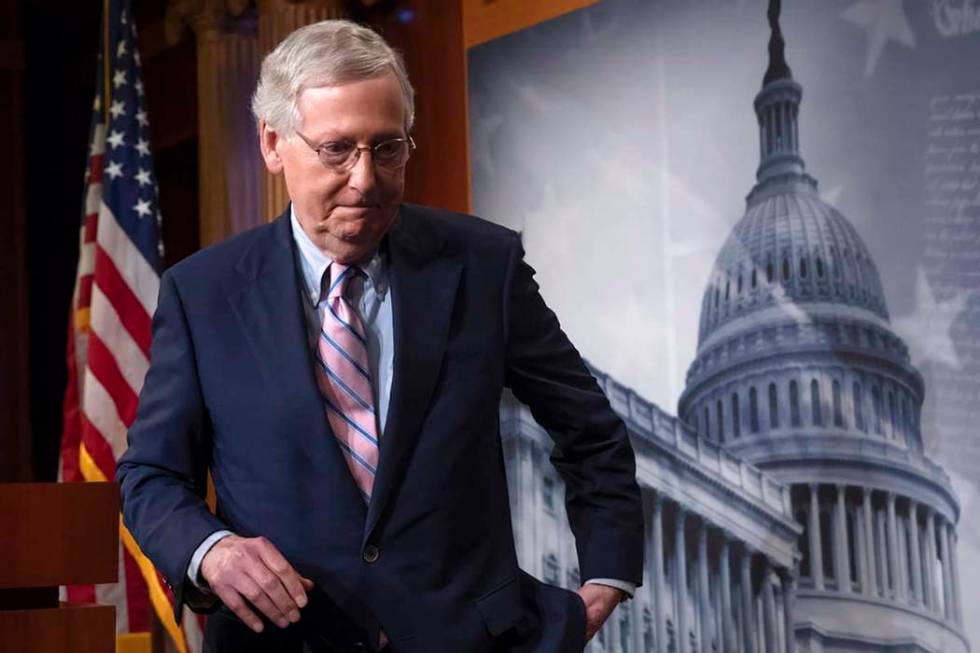McConnell clears way for Senate vote on criminal justice bill

WASHINGTON — Senate Majority Leader Mitch McConnell announced Tuesday that he expects the Senate to vote soon on the First Step Act, a prison and sentencing reform measure endorsed by President Donald Trump last month.
While the measure is expected to pass with bipartisan support, opposition on the right remains.
Sen. Tom Cotton, R-Ark., called the measure a “jailbreak” bill. On Tuesday, he told radio talk show host Hugh Hewitt, “It’s getting pretty late in the day in his lame duck session to be making changes in a highly complex area of the law that have such grave consequences for public safety.”
Most Senate Democrats support the bill, which would revise 1980s and ’90s-era “tough on crime” laws to boost rehabilitation efforts for federal prisoners and give judges more discretion when sentencing nonviolent offenders.
Supporters say the changes would make the nation’s criminal justice system fairer, reduce overcrowding in federal prisons and save taxpayer dollars.
Trump had been an enthusiastic supporter of a version of the bill that dealt only with prison reform. That version, which passed the House by a 360-59 vote in May, increased the good-time credit for inmates, directed authorities to place inmates closer to their homes and included incentives for inmates to compete rehabilitation programs.
At the time, the Trump administration made clear its opposition to expanding the bill’s scope to address sentencing reform.
But shortly after firing Attorney General Jeff Sessions, who opposed sentencing reform, Trump came out in favor of a revised First Step Act that would include provisions to reduce federal sentences for nonviolent low-level drug offenders, increase judges’ discretion at sentencing and curb sentence enhancements for drug offenses committed while possessing a gun.
A prominent supporter for the measure was Jared Kushner, Trump’s son-in-law and senior adviser. Kushner’s real-estate magnate father was sentenced to two years in federal prison after he pleaded guilty in 2005 to tax evasion, witness tampering and illegal campaign donations.
At the time, McConnell made it known that he would forward a revised bill to the Senate floor if supporters could show they had the 60 votes needed for passage.
After Trump’s support brought more Republicans on board, supporters argued that they had exceeded the 60-vote threshold, but the GOP leadership wondered if a vote on the measure could hamper passage of a spending bill needed to prevent a partial government shutdown.
The standoff came to an end Tuesday when McConnell said that at Trump’s request “and following improvements to the legislation,” he expected a revised version to make it to the floor “as early as the end of this week.”
Pat Nolan, a convicted felon, former California lawmaker and director of the American Conservative Union Foundation’s Center for Criminal Justice Reform, said his group prompted 13,000 Kentuckians to send letters urging McConnell to vote for the First Step Act and to allow a vote.
The House is lined up to pass an amended version before the end of the year if it passes in the Senate, Nolan said.
The National Urban League CEO Marc Morial supported the bill, although he argued the bill does not go far enough. “While not perfect, the bill takes aim at moving forward on reducing the harsh application of mandatory minimum sentences,” Morial said in a statement.
If enacted, the First Step Act would be the first sentencing reform measure to become law since 2010 when President Barack Obama signed the Fair Sentencing Act, which reduced the disparity in sentencing for possession of crack cocaine versus powder cocaine. The 2010 measure was not retroactive, but the revised First Step Act would enable inmates convicted before the law to request reviews of their sentences, which disproportionately affected African Americans.
Contact Debra J. Saunders at dsaunders@reviewjournal.com or 202-662-7391. Follow @DebraJSaunders on Twitter.